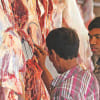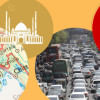Is Ramadan only about not eating?

Of the twelve months in the Arabic or Hijri calendar, Ramadan is the most important and religious month for Muslims all around the globe. Unless someone is ill, elderly, or in the middle of travelling, they are obligated to fast from dawn to dusk for the entire month.
For most people, this is where the understanding of Ramadan ends. They only assume that abstinence from any food or drink is the entire point of it, and do not look at the deeper reasoning behind why this is observed. Due to this, those who do not fast attempt to ease the lives of those who do, and this leads to a slew of issues.
As fasting is the only aspect that they focus on, they are worried about possibly offending the people who fast. Generally, they will try to avoid bringing up the topic of eating in their vicinity, or even feel pressured to censor themselves around fasters as they may feel guilty for being well fed while being around someone who is working just as hard but on less food and energy. This censoring, however, disregards one of the reasons why this fasting is done, and that is to purify the body and soul.
The act of fasting itself is known to have various health benefits, and is good for one's health. However, fasting in Ramadan is also a spiritual act. It teaches self-preservation, because even if they do see food in front of them, it is their responsibility to not be tempted by it, not anyone else's. This goes not just for food, but for any kind of action that is discouraged during fasting. Having someone else try to accommodate them is not only demeaning, but also negating the whole point of why they are fasting.
Another thing to note is that fasters cannot avoid being around food completely even if they tried. The fasting duration is long as it lasts for around roughly about half the day, so they need a nutritious meal to break their fast with. Rather than buying it from elsewhere, most people prefer preparing their own food to ensure that it is as healthy as possible.
Additionally, fasting forces them to break out of their usual eating habits, and so it is quite common for them to try out different meals that will suit their current situation better. This leads them to look up various recipes for ideas. In case anyone wishes to order food from elsewhere, chances are that the people making their food and delivering it are also fasting. Therefore, there is no point in attempting to be hush-hush about food around them, as they will need to be in its vicinity, and may even have to seek it on their own.
It is completely natural for someone who is not fasting to feel bad to sympathise for anyone who is as it is a natural human instinct to do so. But as mentioned, a fast during Ramadan is not the same as a regular fast. The best thing a non-faster can do is to remember that Ramadan is about all submitting to a higher power and forging a sense of empathy for the less fortunate, and they themselves may try to follow these ideals if they wish to.
Namreen listens to the five songs on loop. Send some song recommendations at [email protected]

 For all latest news, follow The Daily Star's Google News channel.
For all latest news, follow The Daily Star's Google News channel. 






Comments